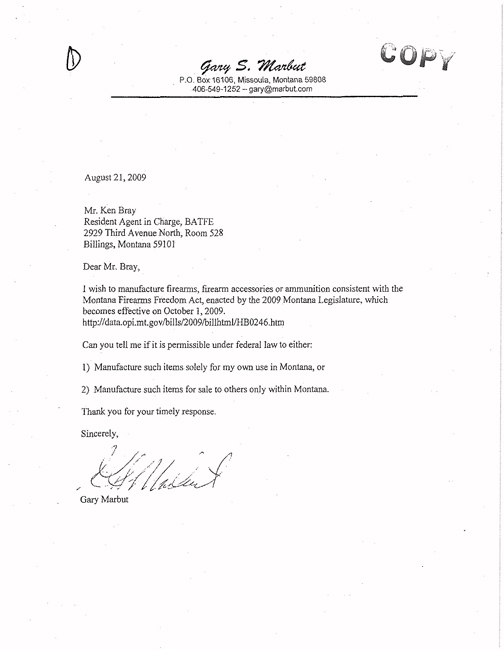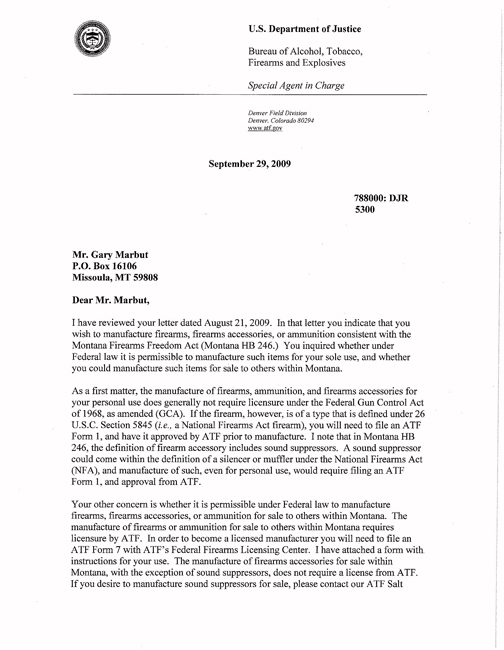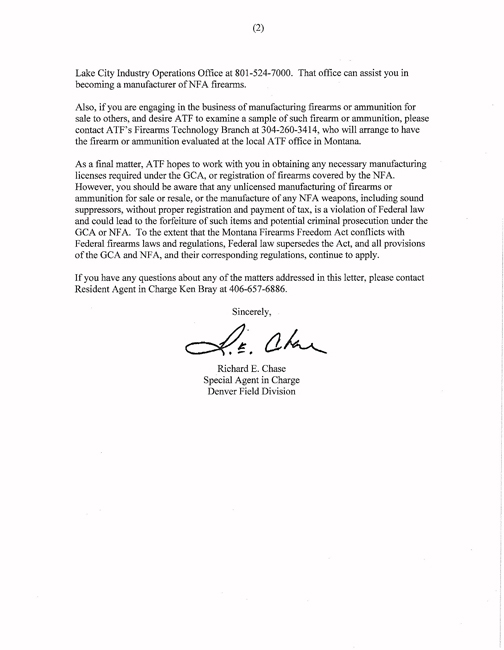Gun Groups File Lawsuit to Validate
Montana Firearms Freedom Act
FOR IMMEDIATE RELEASE
Contact:
Gary Marbut, 406-549-1252
Alan Gottlieb, 425-454-7012
MISSOULA – The Montana Shooting Sports Association (MSSA) and the Second Amendment Foundation (SAF) filed a lawsuit in federal court in Missoula today to validate the principles and terms of the Montana Firearms Freedom Act (MFFA).
The MFFA was enacted by the 2009 Montana Legislature, signed by Governor Schweitzer, and becomes effective today, Oct. 1.
Lead attorney for the plaintiffs’ litigation team is Quentin Rhoades of the Missoula firm of Sullivan, Tabaracci & Rhoades, PC. The MFFA litigation team also includes other attorneys located in Montana, New York, Florida, Arizona and Washington.
“We feel very strongly that the federal government has gone way too far in attempting to regulate a lot of activity that occurs only in-state,” explained MSSA President Gary Marbut. “The Montana Legislature and governor agreed with us by enacting the MFFA. It’s time for Montana and her sister states to take a stand against the bullying federal government, which the Legislature and Governor have done and we are doing with this lawsuit. We welcome the support of many other states that are stepping up to the plate with their own firearms freedom acts.”
“We’re happy to join this lawsuit,” said SAF founder Alan Gottlieb, “because we believe this issue should be decided by the courts.”
The MFFA declares that any firearms made and retained in Montana are not subject to any federal authority under the power given to Congress in the U.S. Constitution to regulate “commerce … among the several states.” The MFFA relies on the Tenth Amendment and other principles to challenge Congress’ commerce clause power to regulate a wide spectrum of in-state activities. This is a states’ rights effort, using firearms as the object of the exercise. The MFFA exempts Montana-made and retained firearms, firearm accessories and ammunition from federal power, saying that if these items do not cross state lines, they are strictly INTRAstate commerce, not INTERstate commerce, and not subject to federal authority.
MSSA continues to strongly urge that no Montana citizen attempt to manufacture an MFFA-covered item, even after the law takes effect today, until MSSA can prove the principles of the MFFA in court. Until the courts rule in support of the MFFA, any such manufacturer could be subject to federal criminal prosecution.
This concept has caught national attention. Tennessee has passed a clone of the MFFA. Other clones have been introduced in Alaska, Texas, Florida, South Carolina, Pennsylvania, Michigan and Minnesota. Legislators in 20 other states have indicated that they will introduce MFFA clones in their states once their legislatures reconvene, Marbut said. Information about the Firearms Freedom Act movement is being accumulated and made publicly available at firearmsfreedomact.com.
This movement follows multi-state rejection of Washington-mandated Real ID, a law passed by Congress requiring state drivers licenses to conform to federal identification standards. The FFA movement also works in tandem with resolutions introduced or passed in many states asserting state sovereignty under the Ninth and Tenth Amendments to the U.S. Constitution. As is the rest of the Bill of Rights, the Ninth and Tenth Amendments are limitations on federal power. The Ninth Amendment says: “The enumeration in the Constitution of certain rights shall not be construed to deny or disparage others retained by the people.” The Tenth Amendment declares: “The powers not delegated to the United States by the Constitution, nor prohibited by it to the States, are reserved to the States respectively, or to the people.”
Under our federated system of government in the U.S., Marbut noted, states and the federal government are widely recognized to share power and authority, with definite limits placed on federal power by the states, the creators of the federal government. The MFFA lawsuit is designed to test and define those limits, to assert states’ authority, and to limit what many see as overbearing authority assumed by Congress and the federal government.
Beginning during the New Deal, federal courts have generally upheld federal commerce clause authority, initially in the 1942 case of Wickard v. Filburn and continuing recently with the 2005 case of Gonzales v. Raich. Raich was the Supreme Court case allowing federal regulation of medical marijuana in California. However, other cases such as the 1995 case of US v. Lopez suggest that federal commerce power is not infinitely elastic, that there are limits to federal commerce power, and that it has just not yet been determined what those limits may be. The MFFA litigation is structured to clarify and affirm those limits.
The modern era of dramatically-expanded federal commerce clause power was ushered in with the Wickard decision. The Supreme Court allowed this considerable expansion of federal commerce power under Wickard only after President Roosevelt threatened to pack the Court with cronies if the Court didn’t cease declaring Roosevelt’s New Deal programs to be unconstitutional and beyond federal reach. ( http://en.wikipedia.org/wiki/Commerce_clause)
MSSA is the primary political advocate for Montana gun owners. SAF is a national organization headquartered in Bellevue, WA that works nationally to advance the interests of gun owners.
Copy of Complaint available Here


